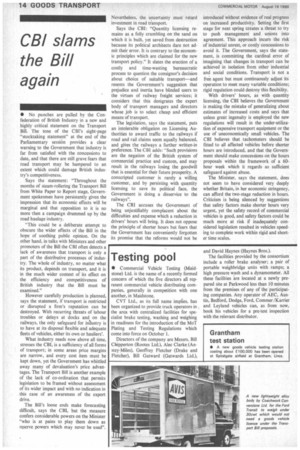CBI slams
Page 16

If you've noticed an error in this article please click here to report it so we can fix it.
the Bill again
• No punches are pulled by the Confederation of British Industry in a new and highly critical statement on the Transport Bill. The tone of the CBI's eight-page "stocktaking statement" at the end of the Parliamentary session provides a clear warning to the Government that industry is far from satisfied with the concessions to date, and that there are still grave fears that road transport may be hampered to an extent which could damage British industry's competitiveness.
Says the statement: "Throughout the months of steam-rollering the Transport Bill from White Paper to Report stage, Government spokesmen have persistently given the impression that its economic effects will be marginal and that opposition to it is no more then a campaign drummed up by the road haulage industry.
"This could be a deliberate attempt to obscure the wider effects of the Bill in the hope of soothing public opinion. On the other hand, in talks with Ministers and other promoters of the Bill the CBI often detects a lack of awareness that transport is only a part of the distributive processes of industry. The whole of industry, no matter what its product, depends on transport, and it is in the much wider context of its effect on the efficiency and competitiveness of British industry that the Bill must be examined."
However carefully production is planned, says the statement, if transport is restricted or disrupted a firm's reputation can be destroyed. With recurring threats of labour troubles or delays at docks and on the railways, the only safeguard for industry is to have at its disposal flexible and adequate fleets of vehicles, either its own or hauliers'.
What industry needs now above all time, stresses the CBI, is a sufficiency of all forms of transport; in some areas price margins are narrow, and every cost item must be kept down, yet the Government has whittled away many of devaluation's price advantages. The Transport Bill is another example of the lack of co-ordination that permits legislation to be framed without assessment of its wider impact and with no indication in this case of an awareness of the export drive.
The Bill's loose ends make forecasting difficult, says the CBI, but the measure confers considerable powers on the Minister "who is at pains to play them down as reserve powers which may never be used". Nevertheless, the uncertainty must retard investment in road transport.
Says the CBI: "Quantity licensing remains as a folly crumbling on the sand on which it is built, yet saved from destruction because its political architects dare not admit their error, It is contrary to the economic principles which are claimed for the new transport policy." It slates the erection of a costly and time-wasting bureaucratic process to question the consignor's decision about choice of suitable transport—and resents the Government's suggestion that prejudice and inertia have blinded users to the virtues of railway freight services; it considers that this denigrates the expert body of transport managers and directors whose job is to select cheap and efficient means of transport.
The legislation, says the statement, puts an intolerable obligation on Licensing Authorities to award traffic to the railways if road and rail claims seem equally balanced, and giVes the railways a further written-in preference. The CBI adds: "Such provisions are the negation of the British system of commercial practice and custom, and may result in the railways losing the goodwill that is essential for their future prosperity. A conscripted customer is rarely a willing customer, and by persisting with quantity licensing to save its political face, the Government is doing a disservice to the railways".
The CBI accuses the Government of being unjustifiably complacent about the difficulties and expense which a reduction in drivers' hours will bring. It does not oppose the principle of shorter hours but fears that the Government has conveniently forgotten its promise that the reforms would not be introduced without evidence of real progress on increased productivity. Setting the first stage for next spring creates a threat to try Lo push management and unions into agreement. This approach incurs the risk of industrial unrest, or costly concessions to avoid it. The Government, says the statement, is committing the cardinal error of imagining that changes in transport can be achieved in isolation from other industrial and social conditions. Transport is not a free agent but must continuously adjust its operation to meet many variable conditions; rigid regulation could destroy this flexibility.
With drivers' hours, as with quantity licensing, the CBI believes the Government is making the mistake of generalizing about estimates of increased costs and says that unless great ingenuity is employed the new regulations will result in the under-utilization of expensive transport equipment or the use of uneconomically small vehicles. The CBI believes that tachometers should be fitted to all affected vehicles before shorter hours are introduced, and that the Government should make concessions on the hours proposals within the framework of a 60hour week which it regards as sufficient safeguard against abuse.
The Minister, says the statement, does not seem to have considered very deeply whether Britain, in her economic stringency, can afford the two-stage reduction in hours. Criticism is being silenced by suggestions that safety factors make shorter hours very urgent, yet the safety record of commercial vehicles is good, and safety factors could be much more at risk if inadequately considered legislation resulted in vehicles speeding to complete work within rigid and shorter time scales.




































































































